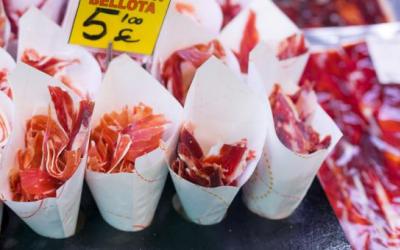A business mission of Russian exporters of agricultural products has opened in New Delhi

From the Russian side, the Ministry of Agriculture of Russia, Rosselkhoznadzor, the Union of Grain Exporters, the National Union of Poultry Farmers and more than 20 leading Russian manufacturers and exporters of agricultural products, from the Indian side - more than 90 importers, traders, distributors, processors and industry associations, including the Indian Chamber of International Business, Indian Cereals and Pulses Producers and Exporters Association, Organic Producers Association and others.
As Maxim Markovich, Director of the Department for International Cooperation and Development of Exports of Agricultural Products of the Ministry of Agriculture of Russia, noted at the opening ceremony, India is Russia's key partner in trade in agricultural products and food in South Asia. In 2022, the trade turnover increased by 60% and amounted to $1.7 billion, however, the Ministry and Russian business see great prospects in the further development of cooperation with Indian partners.
The participants of the mission were welcomed by the trade representative of Russia in the Republic of India Alexander Rybas. He stressed that the event is being held as part of the 37th international exhibition AAHAR - International Food & Hospitality Fair 2023, in which Russia is participating for the first time. “Today the time has come when it is possible and necessary, based on the historical groundwork that was created back in Soviet times, to move on to a new stage of our cooperation. This is the time of transition from simple trade relations to large joint projects in the field of agriculture, processing of agricultural products,” Rybas expressed confidence.
During the plenary session, the main directions for expanding the areas of cooperation in mutual trade in agricultural products were considered. According to Manpreet Singh, President of the Indian Chamber of International Business, agriculture is one of the most important sectors in trade relations between the two countries, and cooperation in this area has been going on for many centuries. Singh spoke about the specifics of the food market in India, including differences in demand and taste preferences depending on the region of the country: “India should not be considered as a single market. If you want to supply your products, you need to diversify your basket, focus on different regions and different segments, and take into account the characteristics of these regions.”
The head of Agroexport, Dmitry Krasnov, who moderated the plenary session, highlighted the main trends in the Indian market and assessed the potential of Russian exports. Over the past 5 years, Russian exports of agricultural products to India have grown almost 5 times and approached $ 800 million. The main supplies are sunflower and soybean oil. “But we see great prospects for increasing shipments in these areas. We expect that by resolving financial and logistical issues, our supplies of oil and fat products can reach 800 thousand tons in the coming years and exceed $1 billion,” Krasnov predicted.
There is also a high potential in the export of leguminous products. About 35% of the population of the Republic are vegetarians, which creates a demand for plant-growing products such as legumes, fresh vegetables, fruits, plant-based meat and dairy substitutes. Bimal Kothari, chairman of the Indian Grain and Pulse Producers and Importers Association, noted the steady growth in demand for pulses: according to forecasts, their consumption in the South Asian country will reach 35 million tons by 2030.
Assistant to the head of Rosselkhoznadzor Artem Daushev pointed to the prospects of exporting meat and finished meat products to India. “We do not supply much livestock products to India yet, but we hope to expand the volumes,” Daushev emphasized. In his speech, he dwelled on the principles of the Russian quality control system, which provides full traceability from the field to the counter.
The Deputy General Director of the Food Corporation of India, Chandrasen Kumar, confirmed the high potential for increasing mutual sales of agro-industrial products, including processed ones, thanks to long-term and historically close bilateral relations based on trust. In turn, the possibilities of Russian suppliers were presented by Eduard Zernin, Chairman of the Board of the Union of Grain Exporters, Sergey Lakhtyukhov, Director General of the National Poultry Union, and Ilya Ilyushin, an independent expert.
Salman Kapadia, director of the HoReCa division of Fortune Gourmet, expressed his willingness to cooperate with Russian suppliers.
Russian financial institutions, such as Sberbank, can help exporters not only support transactions abroad, but also assist in finding partners and organizing negotiations. Ivan Nosov, CEO of the India division of Sberbank, spoke about the work of the bank's branch in New Delhi and the tools offered to both Russian and Indian businesses.
The business mission will last until March 18. Within its framework, a series of working meetings will be held on some of the most pressing issues of mutual trade. Among them are industry meetings on the development of trade in leguminous crops, oil and fat and healthy lifestyle products, as well as a round table with representatives of Indian businesses working in HoReCa, retail and e-commerce channels. An exposition of Russian goods has been organized for potential partners and more than 300 individual b2b meetings and negotiations with Russian companies are planned.


























































